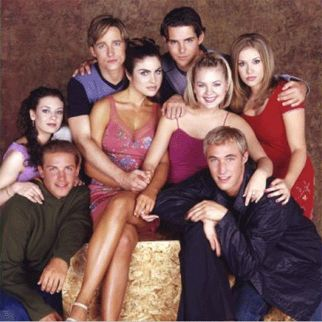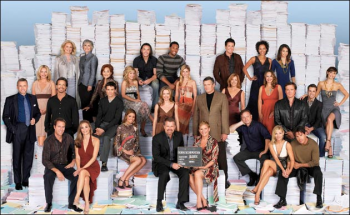What’s Happening on the Soaps? And Why Should We Care?

O'Neil's dismissive pronouncement expresses a sentiment that I think is quite widespread in contemporary U.S. culture, and perhaps in television studies, as well. Perspectives like this not only reek of a kind of gendered cultural elitism that I believe is fundamentally antithetical to the study of television, but they are inaccurate, besides. Eager, perhaps even desperate, to retain viewers and to attract new–and younger–ones, the U.S. broadcast networks have been quite active in their efforts to give daytime soaps a central place in convergent media culture. In fact, the soaps' industry-sponsored on-line presence has preceded that of prime-time programming in multiple ways. In early 2003, Sony's SoapCity.com began to offer downloadable episodes of Sony-owned Days and Y&R, as well as Procter & Gamble-owned ATWT. The downloads, available at $1.99 per episode, presaged the iTunes Music Store's inclusion of TV shows by two and a half years. ABC started its first daytime drama “character blog,” Robin's Daily Dose, by General Hospital character Dr. Robin Scorpio, in October 2005, preceding even ABC's prime-time show blogs (such as those written by two of Grey's Anatomy‘s peripheral characters). And despite the recent flurry of podcasts with actor interviews and behind-the-scenes scoop on offer from many prime-time programs, Guiding Light and As the World Turns are the only U.S. series of which I'm aware that make audio versions of their episodes available as free downloads (commercial-free and tightly edited, you can consume one hour-long episode in half that time). Those media scholars interested in convergence as an industrial and cultural practice would do well to consider the soaps' on-line presence.

Of course, these new media innovations alone are only part of what’s interesting about the soaps these days. More intriguing is the intersection of these industry-hosted on-line efforts and soap fans' already vibrant on-line culture. Fans' interpretations of the changes in the soaps both on-screen and on-line point out the mismatch between the television industry's conceptions of its audience and that audience's own interests and concerns. ABC thinks it is giving viewers “added value” content by offering them access to Robin's thoughts on her blog. Yet the fans see the blog as a poorly-written substitute for the screen time and meaty story they want Robin to have.
There is much to consider in the soaps' stories, as well. For example, General Hospital's tale of mobster Sonny Corinthos has been airing since 1993. Sonny's dark childhood, mental instability, violent outbursts, and marital woes not only bring to mind another tortured television mobster (albeit one somewhat lacking Sonny's chiseled features and disarming dimples), but also point to a rather startling change in soap storytelling in recent years. On General Hospital, Sonny is the main character; viewers are invited to see the world through his eyes, to sympathize with him as he protects his “business,” alternately seduces and rejects the show's supposed “heroines” (whose stories revolve wholly around him), and monopolizes screen time (hence the fans' anger at not seeing more of Robin Scorpio). Sonny Corinthos is certainly in keeping with a tradition of anti-heroes on soaps (begun on GH in the late 1970s with Luke Spencer). But today's GH, featuring a brooding mob boss and his “magic penis” (so dubbed by viewers for its ability to attract–and often impregnate–any woman character who comes near it), is telling a very different kind of story, with different appeals to viewers and different ideological stakes than the soap of the villainess and ideal mother theorized by Tania Modleski in the 1980s. This soap ain't your mother's soap, for better or worse. For me, that makes it all the more significant to ask what's happening on and around a television genre that still fills forty-two and a half hours of national broadcast network airtime per week, 52 weeks a year. Perhaps we should not ask why we should care but instead wonder why more of us do not.
1John Consoli, “Sun Setting on Net's Key Daytime Demos,” Mediaweek, 14 November 2005, Mediaweek.com.
2Quoted in Mark Davidziak, “As the Bubble Bursts: With one busy life to live, is today's restless viewer willing to tune in tomorrow?” The Plain Dealer, 20 August 2002, E1.
Image Credits:
1. Passions
Please feel free to comment.
Why we don’t care
Great questions here, Elana – and definitely fascinating insights on a realm of TV beneath my own radar. I personally think one reason the scholarly focus of the field has turned away from soaps is because it was so focused on the genre for so long. Some of the most important & groundbreaking media studies work examined soaps – I still teach & reference such work that’s over 20 years old now, nearly as old as the field itself. While certainly much has changed within the genre, it seems that more effort is being put toward genres that have been comparatively ignored for years, like sports and cartoons, or emerging forms like reality TV and primetime narrative innovations.
There’s obviously more to say about soaps, but I’m not certain that the average media studies scholar who’s not personally invested in the genre sees the need for more about one of the most examined genres. Arguably soap operas have served as a testing ground for innovations concerning social content and narrative form – perhaps technological & industrial developments going on now on soaps will break out of daytime as well. But until someone can make the argument for why we need to know more about what it seems like we already know, it’s hard to envision a renaissance in soap studies…
Why to care, part II
I understand Jason’s points. I think they exemplify the mainstream stance in contemporary TV/media studies. What I think is at question, however, is the matter of how we conceive of television and its genres. If we conceive of television as static, or of its genres as stable, then I don’t think there is much need to think about or study soaps. However, if we conceive of TV historically (meaning understanding television in historical context), then there are innumerable reasons to think about and study soaps (or sitcoms or prime time dramas or any other form for which strong scholarship already exists).
Soaps have held a peculiar place in TV studies. As Jason mentions, so much of the field’s “foundational” work deals with soaps. But I would argue that it deals with them primarily as stand-ins for feminized culture, or for popular TV, or for active audiencehood, and not as much as historically rooted programming that changes in relation to its industrial, technological, and social/reception contexts (with key exceptions, of course). We give other TV genres this consideration, so why not soaps?
Finally, if scholarship were to follow the mandates of the TV industry and examine only those media instances that seem new–like reality TV–or that seem popular–like animated sitcoms–we not only risk reinforcing the industry’s designations of value, but also risk running out of material to study! If a TV genre is “done” when a body of work has been written about it, even when that work is 20 years old, I fear for the future of our field.
Why I don’t know how to care
I agree with your response, Elana. I certainly believe that genres are historically variable & tied to their social and industrial contexts, and I’d love to see work that updates the “canon” of soap studies to account for some of the new developments you write about. One significant problem is the soap opera’s unique combination of being ephemeral and requiring a good deal of history to understand – as many soap scholars point out, you need to watch a lot of any show to have the backstory necessary to understand a soap. But compared to other genres, soaps are poorly archived & inaccessible to consume in reruns. This means that it is difficult for a non-soap fan to be able to study soaps intelligently without investing years into becoming conversant with a text – or just study soaps as a “stand-in” like suggested above.
Personally, in writing about television genres I chose only to write about soap operas through their parodic mirror of _Soap_ both because I had knowledge of & access to _Soap_ (and wanted to give it its due within TV history!), and because I felt that the topic of soap operas as a television genre had been better explored than others. So maybe the cause of the decline in TV scholarship on soaps is the decline of TV viewership of soaps – if you don’t watch them, you can’t write about them. Hopefully there are some soap fans reading this who’ll heed your call to apply their expertise to reinvigorate the field! (And hopefully someone’s reading this besides us…)
I really love your shows my favorite`s is young and the restless and atwt.I have been a fan for many year`s.I would to have some one on either shows.